Yearning to know what a group of trucks is called? Dive into the riveting world of collective nouns and find out!
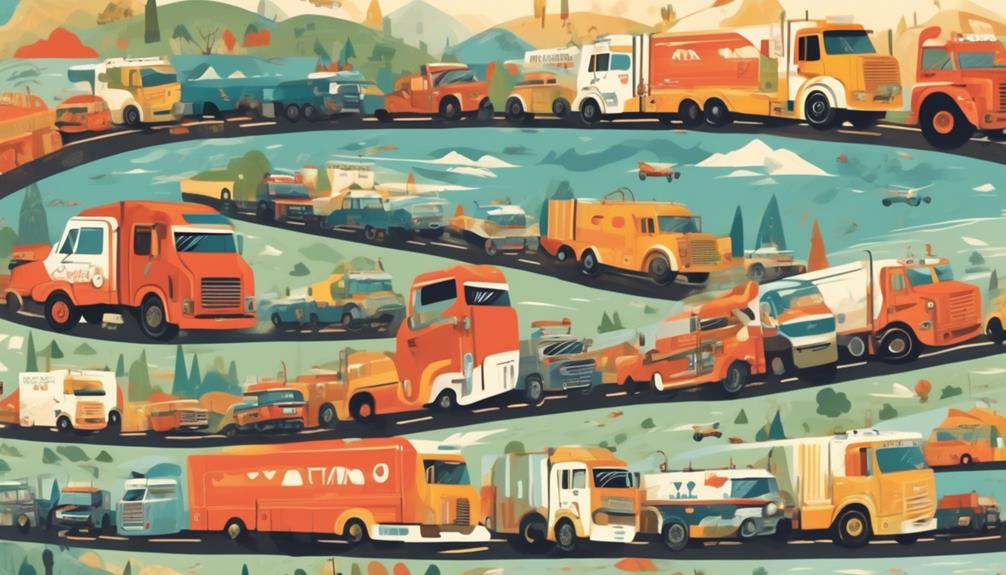
Collective Noun for Trucks
Coincidentally, you’ve probably found yourself stuck in a traffic jam, surrounded by a sea of trucks, and wondered at some point, ‘What on earth do you call a group of trucks?’
It’s a subtle curiosity, isn’t it? You might be surprised to know that there’s more to this question than meets the eye.
As you delve deeper into the realm of collective nouns, you’ll discover that they not only add spice to our language but also reveal fascinating insights about our culture and history.
So, stick around, and let’s embark on this intriguing journey into the world of collective nouns, specifically for trucks.
Key Takeaways
- Collective nouns for vehicles, including trucks, enhance vocabulary and add sophistication to communication.
- Understanding collective nouns for trucks enriches language and allows for more precise communication.
- While the term “fleet” is commonly used as a collective noun for trucks, there isn’t a universally accepted term.
- Context determines the appropriate collective noun for trucks, with “convoy” being suitable in a military or emergency context and “lineup” if trucks are arranged in a row.
Understanding Collective Nouns
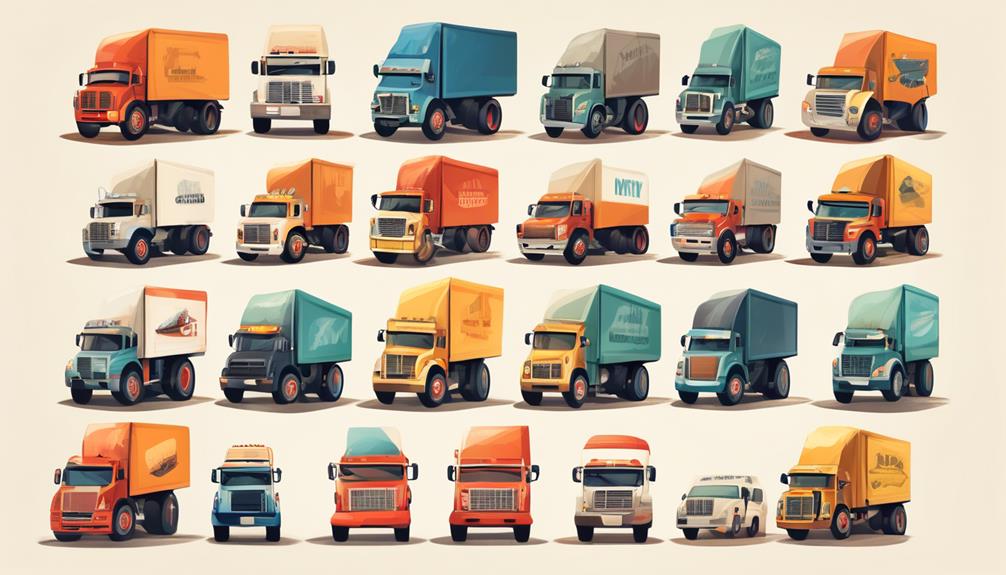
Diving into the world of collective nouns, you’ll quickly come to realize that these unique terms play a vital role in the English language, offering a precise yet creative way to refer to a group of objects, animals, or people. Not only do they enhance our vocabulary, but they also add a layer of sophistication to our communication. Let’s take a closer look.
Collective nouns, by definition, are nouns that denote a group of individuals. While singular in form, they represent a plural concept. For example, ‘team’ is a collective noun that refers to a group of players. Similarly, ‘flock’ is a collective noun that refers to a group of birds.
But it’s not just about grouping. Collective nouns are also indicative of certain characteristics or behaviors of the group they refer to. A ‘murder of crows’ isn’t just about a group of crows; it also alludes to the somewhat eerie, ominous nature of these birds. Thus, understanding collective nouns isn’t merely about memorizing words. It’s about grasping the nuances they carry, the imagery they create, and the richness they add to our language.
Origin of Traffic Vocabulary

Let’s take a journey back in time to explore the fascinating origins of traffic vocabulary, shedding light on how we’ve come to use certain collective nouns to describe groups of vehicles, particularly trucks.
The use of collective nouns for vehicles originates from the Middle English era where groups of things, especially animals, were described uniquely. For example, a ‘flock’ of sheep or a ‘school’ of fish. As transportation evolved, so did our language, and it became necessary to create collective terms for vehicles too.
The term ‘fleet’ was initially used for a group of ships, from the Old English ‘flēot’ meaning to float. With the introduction of motorized vehicles, the term was expanded to include groups of trucks. This linguistic evolution reflects the progress of our society, transitioning from a sea-faring to a land-based transport system.
However, it’s not just about history; language also involves practicality. Using a collective noun like ‘fleet’ provides a concise, clear way to describe a large number of trucks, facilitating communication in sectors like logistics and transport.
Popular Collective Nouns for Vehicles

When it comes to the lexicon of transportation, there are several popular collective nouns frequently used to categorize different types of vehicles. A prime example is a ‘fleet’ of ships or trucks, most often used in commercial contexts. Similarly, a ‘squadron’ is a common term for a group of airplanes, particularly within the military.
Equally noteworthy is a ‘train’ of cars, particularly when they’re connected or moving in a line. You might also hear of a ‘pack’ of motorcycles, denoting a close-knit group of riders, or a ‘convoy’ of trucks, emphasizing their coordinated movement.
On the other hand, a ‘pod’ of bicycles isn’t as widely recognized but is gaining traction among cycling enthusiasts. When it comes to public transportation, a ‘network’ of buses or trams is a familiar phrase.
These collective nouns not only help in providing specific descriptions but also in understanding the functionality, relationship, and context of the group of vehicles. Furthermore, they enrich our language and communication, making them an integral part of our transport vocabulary.
What’s the Collective Noun for Trucks?
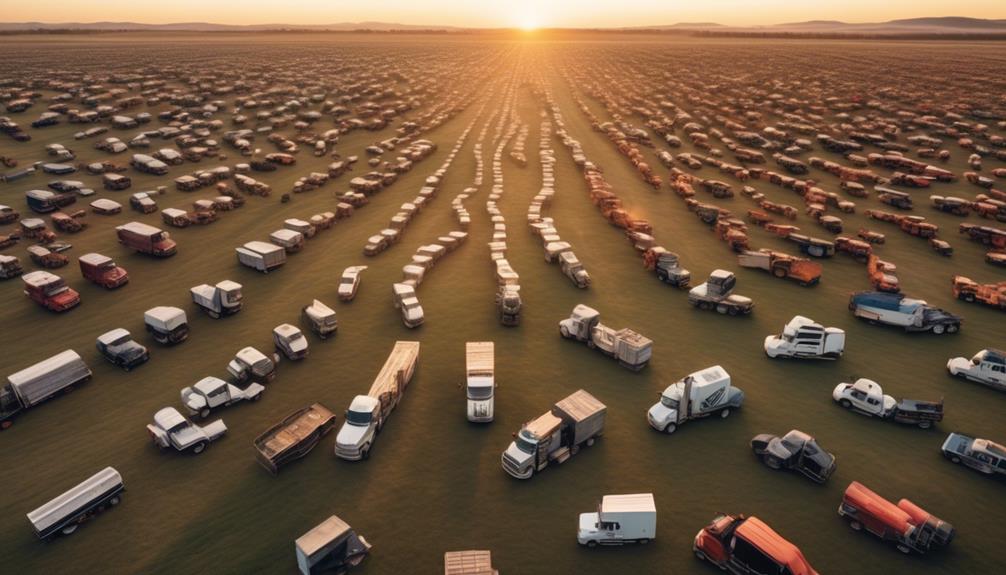
Building on our understanding of collective nouns for various vehicles, you might be curious about the specific term used for a group of trucks. In English, there isn’t a universally accepted collective noun for trucks. However, the most commonly used term is a ‘fleet’ of trucks, especially when referring to commercial or operational trucks belonging to a single company or service.
Much like a fleet of ships, a fleet of trucks denotes a group operating together or owned by the same entity. It’s a term that suggests coordination, uniformity, and a shared purpose or direction. Businesses, for example, may have a fleet of trucks for delivering goods or providing services, all adorned with the company’s logo and branding.
It’s essential to note that collective nouns can be flexible, and context is vital. You could use ‘convoy’ if the trucks are traveling together, especially in a military or emergency context. Similarly, ‘lineup’ could work if the trucks are displayed or arranged in a row. Nevertheless, ‘fleet’ remains the most accepted and widely used term.
Fun Facts About Truck Terminology
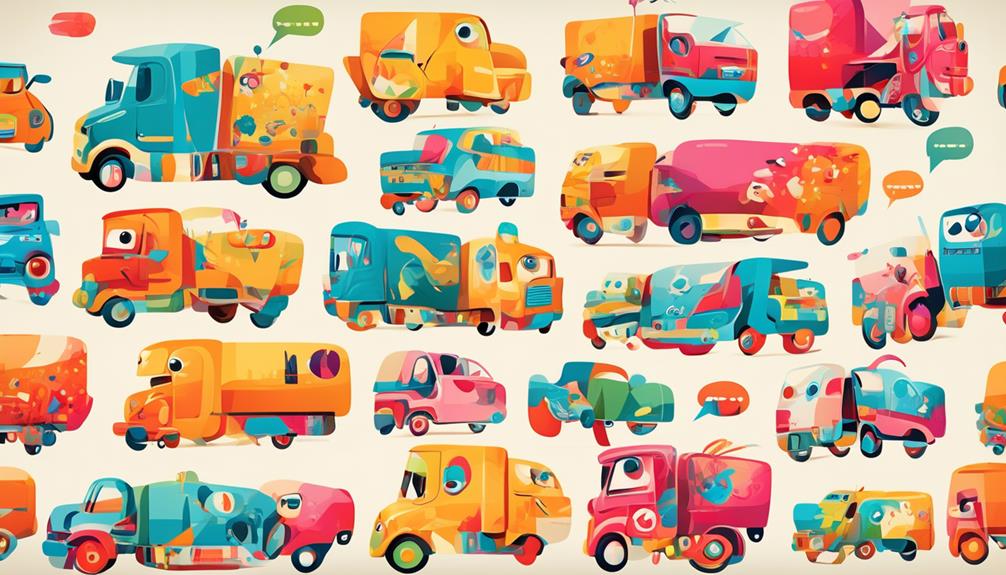
Diving into the world of truck terminology, you’ll find a treasure trove of interesting facts and unique terms that define this industry.
For instance, you might come across the term ‘Bobtail’, which refers to a tractor driving without a trailer attached. It’s a maneuver that’s not commonly done as it’s less fuel efficient.
Then there’s ‘Jackknife’, a term you don’t want to hear if you’re a truck driver. It refers to a situation where the drive wheels of a truck skid and the trailer swings out at an acute angle, resembling a half-opened jackknife. It’s a dangerous and often costly event.
‘Hotshot’ is another term that might catch your interest. It’s a trucking job that deals with expedited freight delivery, often involving smaller loads that need to be delivered quickly.
Ever heard of a ‘Reefer’? No, it’s not what you’re thinking. In trucking, a ‘Reefer’ is a refrigerated trailer used to transport perishables.
Lastly, ‘Deadhead’ – it’s not a fan of the Grateful Dead in this context, but refers to a truck traveling empty, without cargo. It’s another cost-inefficient scenario, as it’s essentially a wasted trip.
These are just a few fascinating elements of truck terminology that make the industry so unique.
Frequently Asked Questions
How Has the Collective Noun for Trucks Evolved Over Time?
You’re asking about the evolution of a certain collective noun.
Over time, language naturally adapts and changes. However, there hasn’t been a significant shift in the collective term for trucks.
It’s typically a ‘fleet’ or ‘convoy’, depending on their purpose and usage. These terms have stayed consistent, reflecting their continued relevance in describing groups of trucks.
Are There Different Collective Nouns for Trucks Depending on Their Specific Type or Function?
Yes, there can be different collective nouns for trucks based on their specific type or function.
For instance, a group of food trucks might be called a ‘feast’ of trucks, while a group of fire trucks could be termed a ‘blaze’ of trucks.
It’s not a strict rule, but it adds a bit of color and specificity to the language.
You’ll often see this linguistic creativity in industries with a variety of specialized vehicles.
Can the Collective Noun for Trucks Be Used Interchangeably With Other Vehicle Collective Nouns?
No, you can’t use truck collective nouns interchangeably with other vehicle collective nouns. Each type of vehicle has its own specific collective noun.
For example, a group of cars is called a ‘fleet,’ but this doesn’t apply to trucks.
Using the correct collective noun is crucial for clarity and precision in communication.
It’s also important to note that specific collective nouns can vary based on region and local vernacular.
Is the Collective Noun for Trucks Used Universally, or Does It Vary by Region or Country?
It’s not universal. You’ll find that the collective noun for trucks can vary by region or country. Different places often have distinctive terminologies.
For instance, in the US, you might hear ‘fleet’ commonly used, while other countries might use ‘convoy’ or even ‘assembly.’ It’s essential to understand the local lingo when discussing groups of vehicles.
What Impact Has Popular Culture Had on the Collective Noun for Trucks?
Popular culture’s influence can’t be understated. It’s shaped the language we use daily, including collective nouns. Movies, TV shows, and music often use such terms creatively, impacting their common usage.
For instance, you may hear ‘a fleet of trucks’ in a war movie or ‘a convoy of trucks’ in a country song. These cultural references can popularize certain terms, making them more widely accepted, even if they aren’t ‘official’ collective nouns.
Conclusion
So, you’ve journeyed through the origins of traffic vocabulary, explored popular collective nouns for vehicles, and finally discovered that the collective noun for trucks is a ‘fleet’.
This terminology not only enriches your language skills but also reflects the functional role of trucks in our society. It’s fascinating how language evolves, isn’t it?
Remember this tidbit next time you spot a fleet of trucks on the highway.
Keep delving into the nuances of language; it’s an endless road of discovery.

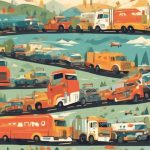


Sign up